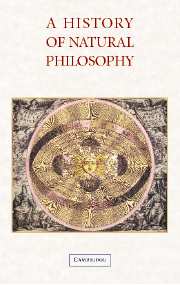Book contents
- Frontmatter
- Contents
- Preface
- 1 Ancient Egypt to Plato
- 2 Aristotle (384–322 BC)
- 3 Late Antiquity
- 4 Islam and the Eastward Shift of Aristotelian Natural Philosophy
- 5 Natural Philosophy before the Latin Translations
- 6 Translations in the Twelfth and Thirteenth Centuries
- 7 Natural Philosophy after the Translations: Its Role and Place in the Late Middle Ages
- 8 The Form and Content of Late Medieval Natural Philosophy
- 9 The Relations between Natural Philosophy and Theology
- 10 The Transformation of Medieval Natural Philosophy from the Early Modern Period to the End of the Nineteenth Century
- Conclusion
- Bibliography
- Index
6 - Translations in the Twelfth and Thirteenth Centuries
Published online by Cambridge University Press: 05 June 2012
- Frontmatter
- Contents
- Preface
- 1 Ancient Egypt to Plato
- 2 Aristotle (384–322 BC)
- 3 Late Antiquity
- 4 Islam and the Eastward Shift of Aristotelian Natural Philosophy
- 5 Natural Philosophy before the Latin Translations
- 6 Translations in the Twelfth and Thirteenth Centuries
- 7 Natural Philosophy after the Translations: Its Role and Place in the Late Middle Ages
- 8 The Form and Content of Late Medieval Natural Philosophy
- 9 The Relations between Natural Philosophy and Theology
- 10 The Transformation of Medieval Natural Philosophy from the Early Modern Period to the End of the Nineteenth Century
- Conclusion
- Bibliography
- Index
Summary
The critical spirit of inquiry that developed and even flourished in Western Europe during the twelfth century was, as we saw, confined to interpreting and elaborating a by-then traditional body of Latin learning that was largely Platonic and Neoplatonic. But even as they exercised their intellects on the old learning, they had become aware that there was a body of learning of which they were ignorant. As Christians slowly wrested control of much of Spain and Sicily from Islamic rule, they came into contact with Islamic culture and the Arabic language. They not only learned of a large body of learning in the Arabic language but also that there were treatises in Greek. We may assume that the literature in the Greek and Arabic languages ranged over the whole spectrum of learning, extending from the humanities and literature to science and natural philosophy. Western interest in this body of literature focused almost exclusively on logic, science, and natural philosophy, largely ignoring the rest of it. The translations from Arabic and Greek to Latin occurred during the twelfth and thirteenth centuries. The lengthy process represents what is probably the greatest intellectual expropriation of knowledge by one culture and civilization from other cultures and civilizations.
THE WORLD OF THE TRANSLATORS
The translators came from all parts of Europe and worked alone or collaboratively.
- Type
- Chapter
- Information
- A History of Natural PhilosophyFrom the Ancient World to the Nineteenth Century, pp. 130 - 142Publisher: Cambridge University PressPrint publication year: 2007



